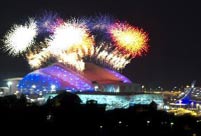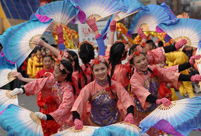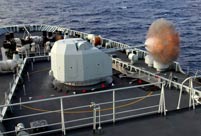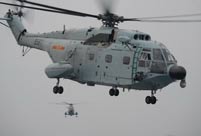 Turnip sculptures amaze tourists in Qingdao
Turnip sculptures amaze tourists in Qingdao Chinese ship formation conducts live fire training in West Pacific
Chinese ship formation conducts live fire training in West Pacific
 China comes in third at figure skating team event
China comes in third at figure skating team event
 China's teenager skater Yan shines at his Olympic debut
China's teenager skater Yan shines at his Olympic debut
 Taiwan-born actor stars on US TV series
Taiwan-born actor stars on US TV series
 Chinese Lunar New Year gift from abroad
Chinese Lunar New Year gift from abroad Chinese champions of Winter Olympic Games
Chinese champions of Winter Olympic Games  Zhang Yimou fined 7.48 mln for over-production
Zhang Yimou fined 7.48 mln for over-production
 Top 10 timeless female Chinese stars
Top 10 timeless female Chinese stars
BEIJING, Feb. 14 -- China's consumer price index (CPI), a main gauge of inflation, rose 2.5 percent year on year in January, unchanged from December and slightly above the market consensus of 2.4 percent, official data revealed on Friday.
The January inflation data included a higher-than-expected rise in non-food inflation, reflecting strong demand during the Chinese New Year period for recreation and household services.
These rises were partly offset by a decline in food inflation thanks to warm weather and the Chinese government's frugality and anti-graft campaign.
Economists expected low CPI inflation could persist for several months, given the negative producer price index (PPI) inflation, strong Chinese currency and weak global commodity prices.
With subdued inflation, the Chinese central bank has enough room to push forward with financial reforms in 2014 while keeping the current monetary policy status quo in place over the coming months to support growth, they said.
LOW FOOD INFLATION
According to the National Bureau of Statistics (NBS), January's CPI inflation rose 2.6 percent in cities, and 2.2 percent in rural areas.
Food prices, which account for roughly a third of the CPI, rose 3.7 percent year on year in January, down from a 4.1-percent increase in December. Prices of non-food products edged up 1.9 percent last month, the bureau said.
In the food category, fruit, milk, beef, mutton, aquatic products and fresh vegetables all rose year on year last month. Fruit prices led the way by jumping 23 percent from a year ago.
Notably, prices of pork, eggs and cooking oil contracted 4.3 percent, 3.8 percent and 4.8 percent year on year in January, respectively, according to the NBS.
Prices of tours and outings soared 14.9 percent last month, as many Chinese chose to travel within China or abroad to celebrate the Chinese New Year, which fell on Jan. 31.
Prices of household services and processing and maintenance services rose 9.2 percent last month, largely because of a labor shortage as many workers returned to their hometowns for the Chinese New Year.
On a month-to-month basis, January's CPI grew 1 percent from December. Food prices in January rose 2.4 percent from the previous month, while prices of non-food products edged up 0.3 percent.
Lu Ting, chief China economist with Bank of America Merrill Lynch, attributed lower food price inflation despite upward distortion by the Chinese New Year to three factors.
First, unusually warm weather in January kept vegetable production and transportation costs low. The government's frugality campaign curbed holiday food consumption demand, especially for pork. Finally, pork supply was abundant but demand failed to catch up, he said.
Meanwhile, China's producer price index (PPI), a main gauge of inflation at the wholesale level, contracted 1.6 percent year on year in January, following a 1.4-percent drop in December, according to the NBS.
LOW INFLATION EXPECTED IN COMING MONTHS
Lu Ting maintained that year-on-year CPI inflation should be lower than 2.5 percent in January if the Chinese New Year effect is taken into account.
The timing of the Chinese New Year holiday should have biased January inflation readings upwards, as the Chinese New Year started on Jan. 31 this year, compared to Feb. 10 last year, he said.
Most likely, headline year-on-year CPI inflation will fall to around 2.0 percent in February, Lu predicted.
"Given the negative PPI inflation, strong RMB and weak global commodity prices, we expect low CPI inflation could sustain for several months," he said.
Ma Xiaoping, China economist with HSBC, agreed.
"We also expect the whole-year CPI to be well below Beijing's annual target," she said, expecting the Chinese government to set the annual inflation target at 3.5 percent.
Ma gave two reasons for the lower-than-target CPI. One is the negative output gap amid weak growth recovery, as indicated by slowdown in both the HSBC and official purchasing managers' indexes (PMIs) due to softening new business inflows and de-stocking activities.
The other is modest upstream price pressures, as indicated by the PPI year-on-year growth rate, which has remained in negative territory for 23 consecutive months amid weak demand related to excessive industrial capacity and receding international commodities prices.
Since overall inflationary pressures remain modest, China should have ample room to carry out reforms. She also said she expects the People's Bank of China (PBOC, central bank) to maintain its status quo of monetary policy in the meantime to support growth in the overall economy.
Lu Ting said that subdued inflation would be supportive of a neutral monetary policy.
"The low inflation gives the PBOC more room to ease the liquidity situation and tame rising rates, even [though] the rise of interest rates was mainly driven by the ongoing bottom-up interest rate liberalization," Lu said.
Chang Jian, chief China economist at Barclays, also looked for lower inflation in February given high base effects due to the Chinese New Year falling in February last year.
She forecast China's full-year inflation for 2014 at 3.1 percent, and said that well-contained inflation supports a neutral monetary stance.
The Chinese central bank had sounded less hawkish and emphasized "stability" and noted that it would maintain appropriate liquidity and create a stable monetary-financial environment, Chang said.
Chang said China's monetary policy bias has shifted to neutral, reflecting changes in economic conditions amid tamed inflation and moderated economic growth.
 Highlights of opening ceremony of Sochi 2014 Winter Olympic Games
Highlights of opening ceremony of Sochi 2014 Winter Olympic Games Highlights of Chinese New Year celebrations around the world
Highlights of Chinese New Year celebrations around the world  Chinese ship formation conducts live fire training in West Pacific
Chinese ship formation conducts live fire training in West Pacific Sanya bans skinny dipping in public beach
Sanya bans skinny dipping in public beach Top 20 most beautiful Chinese stars
Top 20 most beautiful Chinese stars  PLA navy conducts landing drills in South China Sea
PLA navy conducts landing drills in South China Sea  Snowscape in Chinese New Year
Snowscape in Chinese New Year Top 10 timeless female Chinese stars
Top 10 timeless female Chinese stars Top 10 Chinese films in 2013
Top 10 Chinese films in 2013 Ruins of Shang Dynasty's structure unearthed in Shaanxi
Ruins of Shang Dynasty's structure unearthed in Shaanxi  Intercity high speed train in operation for the first
Intercity high speed train in operation for the first  Severe coldness freezes large parts of China
Severe coldness freezes large parts of China  Beautiful moments of Sochi
Beautiful moments of Sochi  It's not just performing this year
It's not just performing this year Selfies of "Little colorful flag" girl unveiled
Selfies of "Little colorful flag" girl unveiled Day|Week|Month